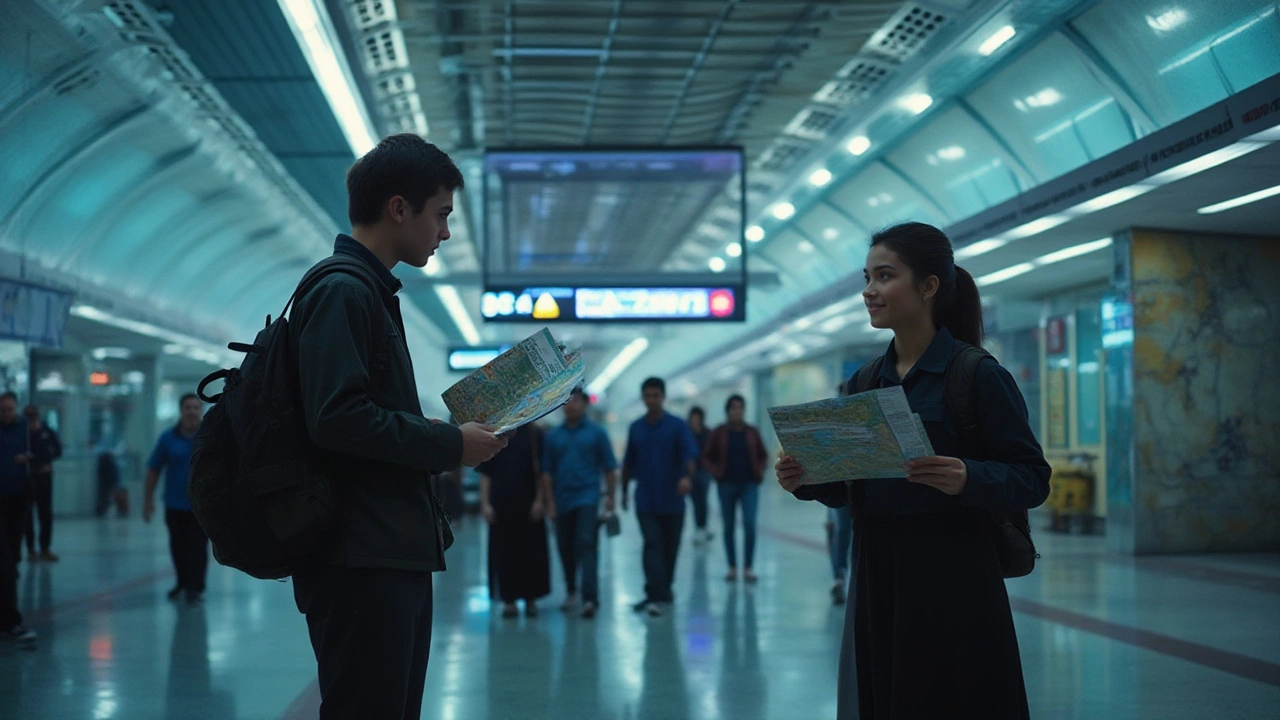Ever wondered if you’ll face awkward language barriers the minute you land in Dubai? You’re not alone! Dubai’s futuristic skyline might have you thinking it’s all glitz and luxury—because, in many ways, it is. But as soon as you step into the city, the real surprise hits you: People from just about everywhere are chatting away in English. Maybe even more than in Paris or Rome. Let’s be real, figuring out how easy it is to get by in English could make or break your entire Dubai trip or expat adventure. So let’s unravel this language mystery and make sure you don’t get lost in translation—literally.
Why English is Everywhere in Dubai
Dubai isn’t just a city—it’s a high-energy international zone with over three million residents and more than 200 nationalities living, working, and playing side by side. Only about 11-13% of the population are actual Emiratis. The rest? Expats from India, Pakistan, the Philippines, Russia, the UK, Africa, the US, the EU...the list goes on. In other words, if everyone stuck to their mother tongue, chaos would rule.
This is why English is king when you’re out and about in Dubai. Not by law—Arabic is the official language—but by necessity. Whether you’re riding in a taxi, shopping in The Dubai Mall, or ordering brunch at a five-star hotel, English is the glue that holds daily life together. Arabic is on road signs and government documents, but announcements in metro stations? English first. The menus at restaurants? English, sometimes with Arabic below. Pay attention in the airport, and you’ll hear barely a hint of Arabic. Even the Emirati locals are often fluent in English, especially if they work in hospitality or retail.
Here’s something wild: Dubai is maybe the most cosmopolitan city in the Middle East. According to Dubai Statistics Center data from 2024, only about 1 out of every 8 people you meet is a local Arab. The rest are expats, and almost all of them get by just fine with English—even if their own first language is Hindi or Tagalog. That’s actually part of why Dubai’s vibe is so unique. People from Lagos, London, and Lahore are communicating in the same lingua franca at work, in school, and during after-hours fun.
Where English Gets You Far—And Where It Doesn’t
Truth bomb: You can live your whole life in Dubai and never need to string together a sentence in Arabic. That’s how dominant English is. But what’s it really like, day to day? Let’s get specific:
- Shopping & Dining: Cashiers, waiters, sales reps—all are trained to serve you in English, whether you’re grabbing shawarma or splurging at Gucci. Even in tiny corner shops run by South Asian workers, English is the go-to.
- Hotels & Tourist Attractions: You really don’t need to worry. From front desk staff to ticket counters to tour guides, it’s English first—sometimes the only language.
- Transport: Taxi drivers, bus conductors, ride-share drivers—they all speak workable English. Instructions in Metro stations are in English, and maps are too.
- Official Documents & Government: Forms are usually bilingual, and government portals are increasingly English-friendly. The customer service teams at major banks, mobile companies, and even the police typically have English speakers on standby.
- Medical Services: Doctors, nurses, and pharmacists in Dubai’s hospitals and clinics almost always speak fluent English, since their patients span half the globe.
- Workplace: If you’re planning to work in Dubai, English is used in most office settings. Contracts, emails, Zoom meetings—English is the default unless you join an all-Arabic team.
But there are a few exceptions worth knowing. Visiting old-school markets (souks) or wandering into certain government offices in the far corners of the suburbs? You might run into folks who only know basic English or none at all. A little patience—or the Google Translate app—solves the problem. More traditional areas, especially crowded labor camps or mom-and-pop cafeterias, sometimes favor Hindi or Urdu. But it’s rare you’ll get completely stuck; most people will find a way to help you out.
Common Questions About Speaking English in Dubai
People love to ask: "Will I offend someone if I don’t know Arabic?" Not at all. The blunt truth? Locals will be pleasantly surprised if you know even a few words of Arabic, but they never expect foreigners to master it. As long as you greet with a smile and basic manners, you won’t have problems.
Another question that pops up: "Is the English in Dubai British or American?" It’s a mix, honestly. Road signs and spelling lean British, so you’ll see “petrol station” instead of “gas station” and “centre” not “center.” But you’ll also spot a mishmash, especially in spoken language. Accents are as varied as the population. Indian English, Filipino English, Arab-accented English, even a bit of Russian flavor—you’ll hear it all and see it on menus, in ads, and on websites. No need to worry if you have an accent. Join the club!
Someone always asks, “Do I need English for everything?” Well, you can get groceries, take a cab, close a deal, see a doctor—yes, English is enough. But paperwork involving visas, court cases, or new laws? Sometimes the original Arabic version applies. Still, you’ll usually get an English copy to sign. Got a legal situation? Get a translator just in case. Most law firms and embassies have English-speaking staff to walk you through the process.
Parents moving to Dubai often fret about their kids’ education. International schools teach in English, and so do many nurseries. Government (“public”) schools teach in Arabic—that’s mostly for Emiratis—but expat families send children to private or British, American, Indian, or IB-curriculum schools, where English is the teaching language. Lots of after-school activities, sports teams, and social clubs run in English too.

Quick Tips for Navigating Dubai in English
Even though English will get you through, there are ways to make your stay smoother and maybe even impress some locals. Here are some battle-tested tips:
- Learn a few Arabic greetings: “Salam Alaikum” (peace be upon you), “Shukran” (thank you), and “Yalla!” (let’s go!) can open doors—literally and metaphorically.
- Be clear, concise, and patient: English speakers come from different backgrounds and accents. Speak slowly if someone looks confused.
- Carry addresses in English and Arabic: If you’re heading somewhere new, especially a small business, screenshot the address in both languages for your taxi driver.
- Use translation apps as backup: Google Translate or Microsoft Translator can save the day if you get lost in translation.
- Don’t stress about formalities: Most places don’t care if you speak Queen’s English or American slang. A smile goes a long way.
- Business cards in both English and Arabic: If you’re working or networking, double-sided business cards impress local partners.
- Read signs carefully: Fines and warnings (like "No Photography" or "Dress Appropriately") are written in English. Always pay attention.
- For longer stays, try learning some basic Arabic: Language centers, like Eton Institute and Berlitz, offer evening courses if you want to level up.
If you enjoy language quirks, watch out for unique Dubai-English phrases like "Kindly do the needful" (Indian English) or "What's your good name?" They might sound unusual if you haven’t heard them before. Don’t sweat it—just roll with the rhythm.
Dubai by the Numbers: English, Arabic, and the Multicultural Mix
Let’s get down to data. Here’s a snapshot of Dubai’s population breakdown and language situation as of January 2024:
| Group | Population Share | Primary Language |
|---|---|---|
| Emiratis (Local Arabs) | 11-13% | Arabic |
| South Asians (India, Pakistan, Bangladesh) | 56% | Hindi, Urdu, Malayalam, Tamil, English |
| Filipinos | 7% | Tagalog, English |
| Western Expats (EU, UK, US, AUS) | 11% | English |
| Others (Africa, CIS, Arab countries, etc.) | 13-15% | Russian, French, Arabic, English, others |
See the trend? With such a gigantic mix of nationalities, it’s no wonder English in Dubai is the language everyone leans on. If you ever wanted a real-world example of how a lingua franca works, Dubai is it—arguably more so than even London or Singapore, because English bridges so many different first languages here.
Where will you hear the least English? Places like labor accommodations, tiny sari shops in Meena Bazaar, or a few government counters in Deira. But 99% of the public-facing world, from gyms to art galleries to yoga studios and cocktail bars, makes English the default.
The Social Side: Making Friends and Navigating Culture in English
Social life in Dubai is a language melting pot. At a rooftop party, you could meet a Brazilian entrepreneur, a South African artist, and a Lebanese banker, all chatting away in English. Meetup groups, brunches, and sports leagues default to English unless everyone happens to share another language. You’ll sometimes overhear Tagalog or Russian in little clusters, but the group conversation almost always switches back to English as new people join in.
English doesn’t just open doors in shops and offices—it shapes social codes too. People use "please," "excuse me," and "sorry" liberally, and a warm “Hi, how are you?” is more common than a curt nod. If you want to connect, be friendly and approachable; don’t worry about having perfect grammar. Most Dubaians are used to a variety of accents, and many will even offer to help if you’re struggling.
The only time language creates distance is if you want to dive deep into Emirati traditions or older social circles, where gatherings may still switch to Arabic (especially among locals). But don’t feel left out. Most Emiratis are gracious and love showing off their culture to expats and travelers—they often switch right back to English to include newcomers in the conversation. Want to make local friends? Learning a dozen Arabic words works wonders as an icebreaker.
When it comes to dating, nightlife, and events, English is again the go-to. Tinder profiles, event invitations on Instagram or Meetup, and WhatsApp group chats are written in English. So, whether you’re flirting at a pool party or organizing a group desert safari, English is the language that keeps things moving.

English in Dubai: The Only Language You Really Need?
If you’re still on the fence, here’s the honest bottom line: You can show up in Dubai with nothing but high school English and easily survive, whether you’re here for three days or three years. Want to sound polite? Learn three Arabic words. Want to work in government, headline a news show, or impress at a traditional wedding? Okay, then Arabic matters. But for everything else—shopping, fun, daily life, dating, dealing with officials—English is more than enough.
Don’t overthink accents or even grammar. In Dubai, what you say matters more than how perfectly you say it. People adapt, smile, and help each other out. That’s why Dubai keeps drawing travelers, professionals, and dream-chasers from everywhere. It’s modern, fast-paced, and impossibly accessible—especially for English speakers.
No need for phrasebooks or crash language courses before your flight. English really does open every door here. The only hard part? Deciding which Dubai adventure to try first.
Dubai Escort
Write a comment